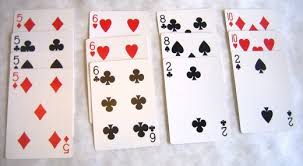Canasta is a four-player, two team card game with many rules, penalties, bonuses, special hands and strategy! It is played with two 52 card decks of cards plus four picture jokers, making a pack of 108 cards. The game was devised in Uruguay in 1939 and gained popularity in the US in the 1950’s. It seems to be making quite a comeback judging from the number of students signing up for my lessons! All you need to play is a special turning tray, two decks of cards and a card table.
- The game is played in several hands where teams accumulate points.
- 8500 points wins the game.
- The object of each hand is to make a minimum of two canastas and to “go out” (use all of your cards) before the other team. The hand is over when either team goes out or there are no more cards left in the tray.
- Players use the cards in their hand to fit into groupings called MELDS (3 or more cards of the same rank).
- You score points by MELDING cards and making CANASTAS which is a Meld of 7 cards.
One of the first things to understand when you begin to play is how to improve your hand so that you can open and start making canastas. There are very specific opening requirements. You also want to put yourself and your partner in a position to be able to “pick the pack” (the discard pile) so that you have a lot of cards with which to make many melds and canastas and ultimately reach the winning 8500 points.
Here are my recommendations to improve your hand so that you can be in a position to open.
After you are dealt your hand of 13 cards, sort your cards by putting like numbers together. Each individual card is worth 5 to 50 points. Keep the following in mind:
- Do you have any triples (3 of a kind)?
- Do you have any pairs (2 of a kind)?
- Hold onto a triple because that is a must for opening.
- Hold on to your triples if you have more than one, because they are melds that can be used toward your opening count without having to use wild cards.
- Hold onto your pairs, because they can be used with wild cards to create melds.
- Discard single or low point cards to keep the pairs and higher point cards in your hand.
Once one partner is open, the other one no longer needs to accumulate enough points to open. The partner is now free to meld cards and “pick the pack.” This is one of the most satisfying and exciting parts of the game. Canasta isn’t that hard to learn and, after some practice, it is a fast moving, fun and social game.
Good Luck and Have Fun!
Lori Greene has been teaching canasta privately and through continuing education programs for 6 years. She is passionate about the game and particularly loves how her groups have continued playing long after their lessons have ended. In her free time she enjoys cooking and entertaining. She is a 25 year resident of Armonk. She can be reached at lorisgreene@gmail.com.

